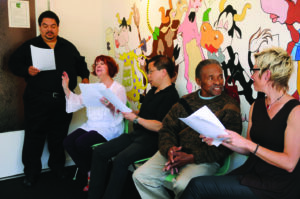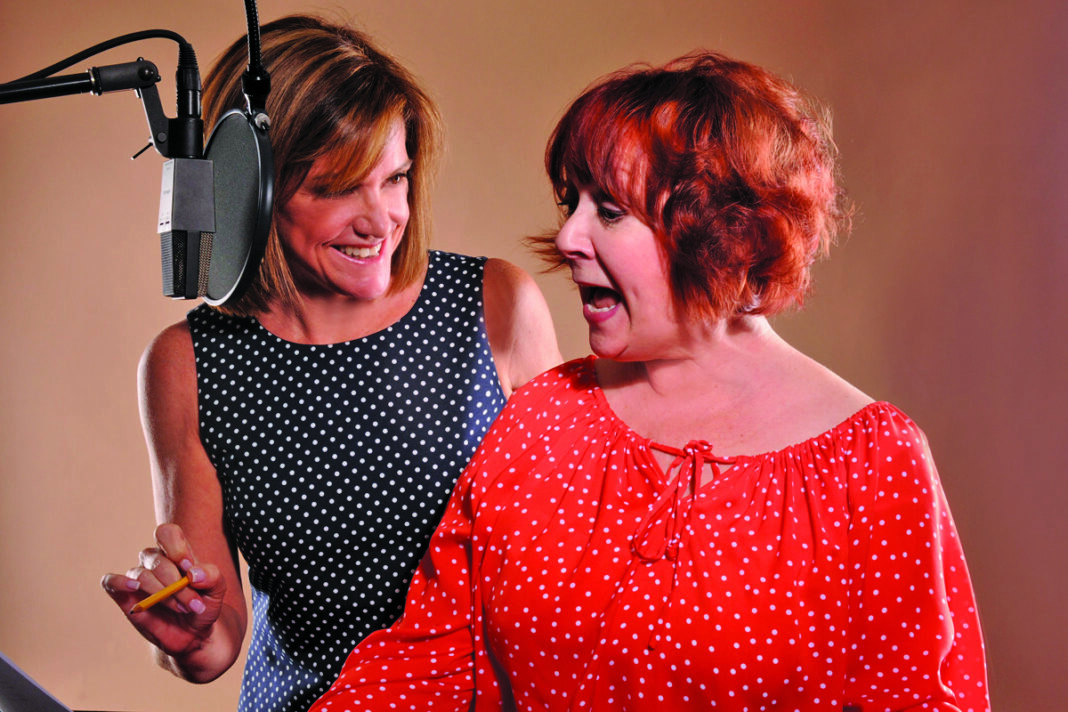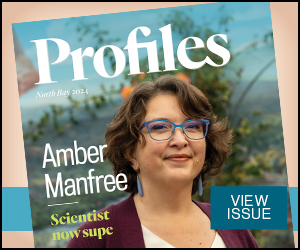“Remember what I always say, ‘Safety lies in the risk.’”
Samantha Paris, gently waving her arms with each syllable she speaks, faces a student, Elizabeth Frazier, through the glass of the recording studio. About a dozen other students watch as Paris does her thing.
“Now let’s try that again,” she tells Frazier, who’s just been practicing a line of advertising copy for Stouffer’s macaroni and cheese, performing it in the bright-and-chipper style of Julie Andrews.
“This time, let’s do something different,” Paris says. “This time, I want you to seduce us.”
“Oh, god!” Frazier says, laughing.
“So let’s try for the color violet,” Paris continues. “Give me super sensual and super sexy and do it in a nice, low pitch. Take a nice deep breath in, let it out slowly, and then say the line. Ready? Let’s go.”
“There’s one very good reason,” Frazier begins, “why Stouffer’s hasn’t changed its macaroni and cheese recipe … in 35 years. You’d never forgive us.”
She nails it. Never has macaroni and cheese sounded sexier. To the raucous cheers of the class, Paris says, “Elizabeth … that was beautiful. That’s voice acting people! Now, let’s try orange—really nurturing and warm. Ready? Go!”
It’s a Saturday afternoon at Voicetrax voice-over academy in Sausalito, and founder Paris is teaching an intermediate level two-session script analysis class. The students have been working at identifying various ways to deliver advertising copy, by identifying different “colors” that are suggested in the text. This technique is designed to help the actors engage their full range of vocal abilities.
They’ve also learned little tricks to help them get out of their own comfort zones, including singing the copy in the style of opera, rap or country western, just to bypass the tendency to overthink their performances. Clearly, such techniques are working. After all, Paris has been doing this kind of work, and teaching it to thousands of students, for the last 30 years.
“My teaching is very unconscious,” Paris says, after the class. “I don’t think that hard about it. I just do it. It’s a stream of consciousness. For me, it’s all about having an open heart, and listening. I know that some of my students are going through a lot, and I know I need to acknowledge that.”
In today’s class, for example, there are students who’ve recently overcome strokes or heart attacks, unplanned retirements, divorces, break-ups and more. Some suffer crippling stage fright. Others struggle with low self-esteem, and view voice-acting as a way to come face-to-face with their anxieties. Paris says that she does whatever it takes—coaxing and sweet-talking, joshing and teasing, delivering hilarious F-bomb-laden encouragements or offering plain, honest, straight-taking criticism—to facilitate the necessary breakthroughs.
“This sounds a little corny, but I’ve learned that if I can just be authentic, and come from love, it’s going to be OK, and I’m going to say the right things,” Paris says. “We all have our baggage, of course. We talk about this all the time here. That microphone doesn’t lie. If you are hurting, or angry or whatever, that’s going to come out—and the microphone will reveal it.”
Voicetrax currently employs 35 experienced teachers, has more than 300 students and offers 80 different voice-over courses. Courses are offered in two six-month “semesters,” and take place morning, noon and night, seven days a week. “That’s crazy, huh?” Paris says. “I mean, ‘How did this happen!’ right?”
That’s a question that she answers in Finding the Bunny, a charmingly crafted memoir of her journey from fanciful, insecure, TV-obsessed Los Angeles kid to her current position as the owner of the largest voice-over training program in the country. Born in Southern California, Paris dreamed early of becoming an actress, a goal that was not enthusiastically supported by her parents, who struggled with alcoholism, and often made her feel less intelligent than her more bookish brother and sister. As she describes in the book, she eventually came to see the Playboy magazine bunny logo—an image (hidden somewhere on the cover of the magazine each month) that made a regular appearance in her home, thanks to her older brother—as a kind of symbol for searching for one’s hopes and dreams.
She soon set out to find her own “bunny,” which in her case, she knew, would have something to do with acting. At the age of 16, Paris landed an agent, and quickly began getting work in front of the camera (including prominent roles on James at 16, Touched by an Angel, ABC Afterschool Specials and others), as well as in front of a microphone (including voice work on Jem and the Holograms, Bionic Six and thousands of commercials). It was as a voice actor that she says she found the most freedom to become whoever she wanted to be.
After moving to the Bay Area in 1988, and choosing Mill Valley as her home, she found herself teaching voice-over (almost by accident) to a rapidly increasing number of eager Bay Area students. That was three decades ago.


Almost immediately, under the business name Voicetrax San Francisco, Paris’s reputation as a teacher took off, boosted by stellar word-of-mouth from her students, and by regular appearances on KGO’s The Ronn Owens Show, where she would “audition” wannabe voice actors live on the radio. Eventually, Paris’ operation was moved from her living room to downtown Sausalito, where the Voicetrax academy was built.
“People are often surprised at how much available work there is in the voiceover industry,” Paris says. “And that’s specifically true here in the Bay Area. Thanks to Silicon Valley, the average Bay Area voice actor, with a talent agent, can do very well in this business.”
Paris is taking a break in an adjoining studio. Just outside the door, another, even more raucous class—this one focusing on video game voice-overs—is taking place. A quick glance around the room shows a fairly even mix of male and female students.
“When I first started in this industry, in the ’70s, 90 percent of all voice-over work was being done by men,” Paris acknowledges. “Nowadays, it’s about 60 percent men, 40 percent women. So things are getting better.”
Another change in the industry, she points out, is that it’s no longer necessary to have an agent to land voice-acting gigs, though Paris insists that it is still the best route toward getting steady work.
“Having an agent puts you at the top tier of voice actors,” she says, “but there’s now a tier right below that.”
There are, she explains, a number of websites where one can audition for various voice acting jobs, usually for a yearly fee.
“The pay is lower for those jobs, and most of the work isn’t quite so sexy, but there are jobs available at that just-below-having-an-agent level,” Paris says.
Obviously, some people do well with such “second-tier” approaches. “But a lot of them don’t,” Paris says, “because there’s a tendency for people to sign up, pay their money and start auditioning before they really know what they’re doing. Back in my day, when there were just talent agents, you had to study your craft, and study some more, until you were fucking great. You were not going to be signed by an agent until you were great. And that takes a lot of work, and a lot of dedication. If you want to be successful, you have to put in the effort. You have to do the work. And you have to believe in yourself.
“And that,” she continues, “takes work, too.”
Ironically, Paris says she found it harder to follow her own advice when it came to writing Finding the Bunny. She first set out to write the book four years ago, in hopes of releasing it in time for Voicetrax’s 30th anniversary.
“But I was scared out of my mind,” she says. “At first, I hired a ghostwriter, because I assumed I wasn’t smart enough to write it myself. Growing up, I was always told I was stupid. My brother and sister were the readers in our house. They always had their noses in a book. I always had my nose buried in the television. It ultimately paid off, since I’ve had a career doing cartoons and commercials and stuff. But when you don’t read as a kid, and everyone else does, you can easily develop a self-identity as the stupid one.”
After spending “a small fortune” on the ghostwriter, Paris says that she wasn’t happy with the way the book was turning out.
“It finally dawned on me, ‘Well shit, Samantha. If you want a memoir, you’re going to have to write it yourself.’ But I was still petrified, just frozen in fear. I always talk about how safety lies in the risk. But I was so scared to dive in and start writing.”
What finally gave her the courage, she says, were her students.
“To me, they are so brave,” she says. “It was pretty obvious that I had to do what they do when they come in here. I had to take the risk. So I basically just said, ‘Oh Sammy, fuck it. Just start and see what happens.’”
It took another three years, but she finally completed the book, with a forward by actor Peter Coyote. “It’s so funny,” she says. “I constantly tell my students that anything they set their minds to, they can do. But I’d had such a hard time believing that for myself. When the moment finally came that the truck arrived at my house, and 1,000 copies of my book were delivered to my garage, I was shaking so hard that my husband had to open the first box and put the book in my hands.”
As for what’s next, Paris says that she’d love to see the book developed into a television show about the voice-over industry. Maybe she’ll even try writing another book. And of course, she plans to continue training new voice actors.
“I’ve always had the philosophy that you have to just enjoy the journey, work hard, be authentic, come from love and see where that takes you,” she says. “I swear to God, that’s how I live my life. The older I get, the more I’m into having an awareness of what the universe is telling us. I truly believe this book is going to take me someplace else, and I’m really looking forward to finding out what that is.”
Samantha Paris and some of her students will be performing sections from ‘Finding the Bunny’ on Sunday, April 15 at Book Passage, 51 Tamal Vista Blvd., Corte Madera, 4pm; bookpassage.com.












